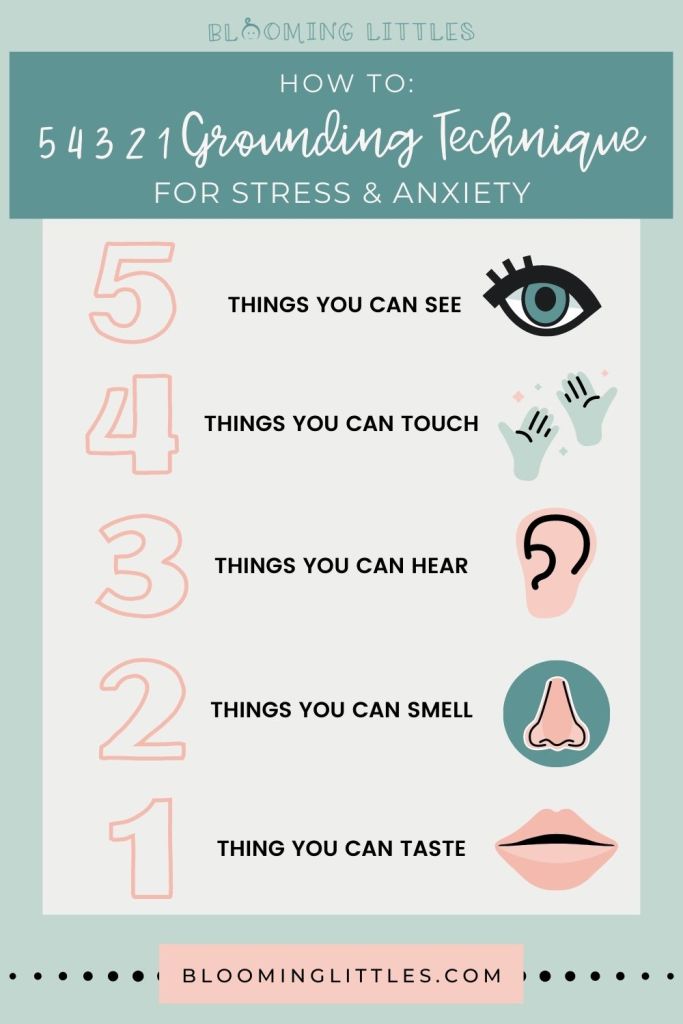
Rates of anxiety and depression are on the rise. Parents need effective, low cost strategies that work! Diaphragmatic breathing, mental distraction, and grounding exercises are three highly-effective strategies for combating anxiety and panic attacks. They are each backed by research, and can be used anywhere…anytime. It doesn’t matter if you’re sitting at your premature baby’s bedside, or driving to the hospital for the 80th day in a row. Learn the HOW and WHY for each of these techniques and see if one helps calm your mind today.

If you’re a NICU mama, there’s a wide range of emotions you are processing on top of becoming a mom!
The sounds, sights, and role shift (among a million other things) that come with the NICU experience can leave you anxious, traumatized, and emotionally burdened.
Hold onto hope today!
Today is all about 3 evidence-based techniques proven to decrease your anxiety and stress responses.
Can I get a hallelujah?!
As moms, we need low-cost, self-administered interventions that reduce our stress and anxiety and that actually work!
Maybe you need something today—right now.

Each of these techniques is backed by tons of research and approved by counselors and psychologists around the world.
I hope one works for you.
DIAPHRAGMATIC BREATHING
Also called “belly-breathing, or abdominal breathing—diaphragmatic breathing works to:
- strengthen our diaphragm
- promote better oxygen exchange
- lower our heart rate
- regulate our blood pressure
- slow blood flow
- reduce our sympathetic response (“fight or flight”)
- level out our breathing pattern
You guys, most of us have terrible breathing patterns (I am one of the worst—my physical therapy husband can attest to that!).
Diaphragmatic breathing is all about leveling out your breathing and slowing…it…down.

The diaphragm is a big muscle under our lungs…it tightens and moves downward when we breathe in (leaving more room for our chest to expand), and relaxes and moves upwards when we breathe out.
Diaphragmatic breathing focuses on expanding the lungs down into the diaphragm instead of taking “chest breaths” using our ribcage.
If you have anxiety, you’re likely “chest breathing”, which can lead to a lot of muscle pain and tightness in your chest, back, shoulders, and neck. You definitely don’t need that!
By practicing diaphragmatic breathing exercises several times a day, you’re decreasing the effort and energy needed to breath.
It takes the effort off your chest and neck muscles during breathing to promote muscle relaxation.
You don’t need any equipment, and you can do it anywhere, anytime!
HOW TO DO DIAPHRAGMATIC BREATHING
When starting out, it can be easier to learn this breathing pattern while lying on your back. But you can perform this exercise in sitting or standing, depending on where you are, and what’s available to you.
- Lie on your back with your knees bent (place a pillow under your knees for extra support and comfort)
- Place one hand on your chest and the other on your stomach, right beneath your rib cage
- Begin to inhale (breathe in)
- As you inhale, slowly breathe in through the nose, down towards your belly.
- Your stomach should push out against the hand resting on it, while your chest remains still.

4. Exhale (breathe out)
-
- Breathe out slowly through pursed lips as your stomach returns to its original, relaxed position.

5. Repeat inhale and exhale for 1-2 minutes when starting out and work your way up to 5 to 10 minutes.
Your chest should remain still throughout the entire exercise, both the inhale and exhale.

**Please note, this type of breathing pattern may lead to lightheadedness as you’re starting out. If you begin to feel lightheaded, be sure to lie down until it goes away.
THE RESEARCH BEHIND DIAPHRAGMATIC BREATHING FOR STRESS AND ANXIETY
There are a lot of benefits related to controlled, diaphragmatic breathing!
Some benefits are:
- Decrease in the perceived stress level of adults
- Significant reductions in anxiety scores and breathing rates
- Promotes a relaxed state
- Reduces stress
- Improves sustained attention
- Improves overall mental function
- Lowers cortisol levels
- Decreases panic attacks
Feeling panicked, stressed, or anxious? Having trouble calming your body and your mind?
I hope you’ll give this a try!
You can even help your baby learn coping skills!
See my post on 5 WAYS TO HELP YOUR BABY LEARN COPING SKILLS IN THE NICU.
DISTRACT YOURSELF WITH A CHALLENGE
You guys, distraction is definitely not a long-term solution, because too much of it can lead to straight up avoidance.
BUT, distraction can be very effective in providing some temporary relief from uncomfortable symptoms related to panic or anxiety—until it passes.
Distract yourself by focusing on something challenging and close-ended…meaning the activity has an end to it. It can’t just continue until you choose to stop (like Netflix or scrolling Instagram).
This is something you can do the second you feel panic or anxiety bubble up—no matter where you are.
At your baby’s bedside in the NICU waiting to hold your baby? Keep your mind busy with an online sudoku or crossword puzzle.
Unable to focus because you’re swimming in thoughts related to your baby‘s weight or feeding or sleep? Count backwards from 100 by 7.
Feeling panicked for a reason you can’t even identify? Say your times tables…2×1=2; 2×2=4; 2×3=6; 2×4=8, and so on.
The goal is to find a mental activity that is somewhat difficult to complete, so you are so focused on figuring out the right answer, or solving the puzzle that you temporarily forget or lose focus on the uncomfortable symptoms you’re having related to anxiety or fear.
There are tons of websites that offer free sudoku puzzles or word searches.
Sudoku—free, unlimited puzzles
Lumosity—free brain training app
The Word Search—free, unlimited word searches
Also, if you join our email list in the sidebar above, you’ll get some fun brain activities sent to you each month, plus other feel-good goodies.
Let’s equip ourselves to fight that anxiety and stress!
Ground Yourself
This technique can be incredibly effective for moms with postpartum anxiety, post traumatic stress disorder, or panic disorders.
Grounding techniques are used to help turn your focus away from thoughts, memories, or worries and refocus your mind on the here and now.
It is all about focusing on the present environment and stepping back from negative thoughts.
Refocusing your attention can lead to a more calm, relaxed, and balanced mind.
Sound too good to be true… so, how do you do it?
There are actually quite a few grounding techniques out there, but I’m going to share the 54321 method, because it’s effective and easy to remember.
THE 54321 GROUNDING EXERCISE
You can do this exercise in your head or verbalize things out loud.
The overall goal is to identify things in the world around you.
There are five steps that take you through all 5 senses:
- Acknowledge FIVE things that you SEE around you.
- Colors, objects, people, nature…anything in your surroundings
- Acknowledge FOUR things you can TOUCH around you.
- Your clothes, chair, skin, hair textures, etc.
- Acknowledge THREE things that you can HEAR.
- Your own breathing, the wind, trees rustling, people walking, etc.
- Acknowledge TWO things you can SMELL.
- Perfumes, lotion, hand sanitizer, your lunch, etc.
- Acknowledge ONE thing you can TASTE.
- Gum, coffee, soda, etc.

**Screenshot or save this image to Pinterest as a reminder!
HOW GROUNDING EXERCISES HELP TO REDUCE STRESS AND ANXIETY
- Help to manage overwhelming feelings
- Distract your mind from anxiety
- Remind you where you are
- Help you calm down quickly
- Focus on the world diverts the focus from your anxiety
- Help you calm down quickly before panic sets in
- Help slow your heart rate and breathing rate
- Help you feel more in control of your situation and surroundings
Are any of these strategies the golden ticket to managing stress, anxiety, or fear?
Probably not.
BUT, each of these exercises can be extremely effective in helping you manage the uncomfortable physical and mental symptoms associated with stress, panic, and anxiety.
Add one (or ALL) of them to your mama toolbox.
Personally, I’ve been working to be more conscious about breathing with my diaphragm instead of my chest. It has seriously helped with my neck pain and headaches. Woo hoo!
Also, please do not get discouraged, if these strategies aren’t your answer. These are simply tools for your toolbox.
Sometimes trauma and anxiety are so intense it goes beyond a simple exercise. If you are having persistent feelings of worry, loss of interest, difficulty sleeping, panic attacks, or traumatic flashbacks…please contact your primary care doctor or OBGYN to talk about counseling or managing those feelings with medication.
Mama, I don’t know what today holds for you, but lets take it one day at a time.
And if one day is too much to think about…aim for one hour, one minute, even one second at a time.
Life can be a lot sometimes…I’m here for you.
If you have anything specific you want or need prayer— go ahead and send me an e-mail through the contact me page.
I would be humbled to provide you with prayer, encouragement, and hope during this season of life.
You can do this!
Interested in learning more? Check out some other popular posts.
- WONDERING IF YOUR BABY HAS A FLAT HEAD?—HERE’S WHAT YOU NEED TO KNOW ABOUT FLAT HEAD SYNDROME.
- THE ONLY 10 TOYS YOU NEED FOR YOUR BABY FROM BIRTH TO 6 MONTHS

References
Alkozei, A., McMahon, E., & Lahav, A. (2014). Stress levels and depressive symptoms in NICU mothers in the early postpartum period. The Journal of Maternal-Fetal & Neonatal Medicine, 27(17), 1738-1743.
Chen, Y. F., Huang, X. Y., Chien, C. H., & Cheng, J. F. (2017). The effectiveness of diaphragmatic breathing relaxation training for reducing anxiety. Perspectives in psychiatric care, 53(4), 329-336.
Hopper, S. I., Murray, S. L., Ferrara, L. R., & Singleton, J. K. (2019). Effectiveness of diaphragmatic breathing for reducing physiological and psychological stress in adults: a quantitative systematic review. JBI Evidence Synthesis, 17(9), 1855-1876.
Janet SK, Mangala Gowri P. Effectiveness of deep breathing exercise on blood pressure among patients with hypertension. Int J Pharma Bio Sci 2017; 8 (1):B256–B260.
Katarzyna (Kate) Rygiel (September 18th 2019). Deep Diaphragmatic Breathing: A “Portable Intervention” for Stress Reduction among University Students, Effects of Stress on Human Health, Hülya Çakmur, IntechOpen, DOI: 10.5772/intechopen.86731.
Perepelkin, J., Antunes, K., Boechler, L., Remillard, A. J., & Mildenberger, L. (2019). Providing mindfulness meditation for patients with depression and anxiety in a community pharmacy: A pilot study. Journal of the American Pharmacists Association, 59(2), 258-264.
